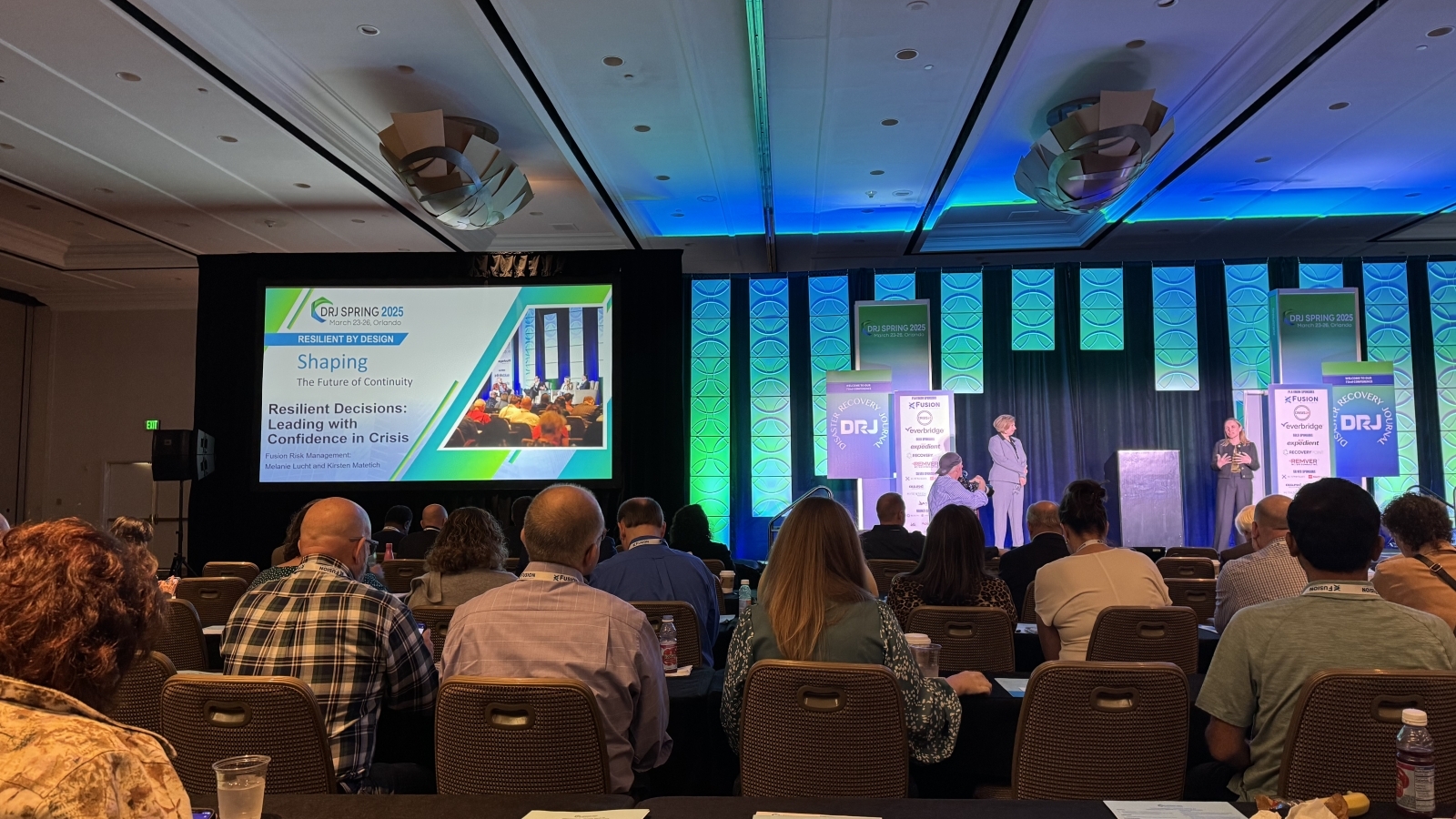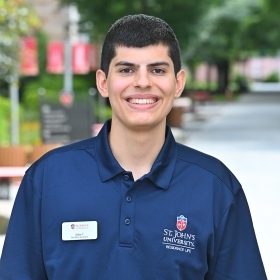How Attending a Crisis Conference Expanded My Homeland Security Education at St. John’s

If you are a homeland security student or interested in disaster recovery careers, attending a professional conference can be transformative. This spring, I had the wonderful opportunity to attend the Disaster Recovery Journal (DRJ) Conference in Orlando, FL.
As a graduate student in the Homeland Security and Criminal Justice Leadership Master of Professional Studies program at St. John’s University, this experience enabled me to connect with industry experts, gain career insights, and bring my classroom learning to life.
What Is the Disaster Recovery Journal Conference?
The Disaster Recovery Journal (DRJ) Conferenceis the longest-running and most widely attended event focused on business continuity, disaster recovery, crisis communication, and risk management. Held twice a year, this conference brings together professionals from around the world to share insights, explore innovative solutions, and strengthen organizational resilience. The importance of the conference lies in its commitment to equipping professionals with the tools and knowledge needed to protect organizations against evolving threats and disruptions.
This year’s conference theme revolved around building resilience through innovation, cross-functional collaboration, and proactive risk management. Attendees included a wide range of professionals from the public and private sectors—homeland security specialists, emergency managers, continuity planners, information technology disaster recovery experts, students, and academics.
My Experience Attending the Conference as a St. John’s Homeland Security Student
I had the privilege of attending the DRJ Spring 2025 Conference as a recipient of the Student Attendee Scholarship, which enabled me to engage directly with experts and innovators across the resilience field.
I attended the conference alongside Bernard A. Jones D.Sc., Associate Professor of Homeland Security and Program Director of the Homeland Security Doctor of Professional Studies Program at St. John’s University, who was also a featured speaker at the conference. Dr. Jones is a certified business continuity and disaster recovery professional with more than 20 years of experience reviewing, implementing, and managing business continuity and emergency management programs in the private sector. His leadership and presence at the event underscored the vital connection between academic preparation and professional execution in the field of homeland security.
As a student and emerging professional, I was particularly eager to see how theoretical frameworks are applied in real-world crisis scenarios. I also took this opportunity to share the robust academic offerings and resources we have at St. John’s University, including our undergraduate and graduate programs and homeland security crisis simulation laboratory, which are designed to prepare the next generation of leaders in this vital field.
One of the most eye-opening lessons I took away from the DRJ Spring 2025 Conference was how deeply embedded homeland security and disaster recovery are within the private sector. Often, when we think about homeland security, we picture government agencies, emergency responders, or public safety officials. However, this conference made it clear that resilience is also a top priority for major players in various private industries such as entertainment, finance, health care, hospitality, insurance, technology, and more.
Networking with Resilience Leaders and Mentors
Many of the practitioners I had the privilege to meet and connect with are professionals leading continuity, crisis management, and risk programs from various industry-leading Fortune 500 firms, such as Google, The Walt Disney Company, and JPMorganChase. These individuals serve as the backbone of organizational resilience—developing and executing strategies to reduce downtime, secure assets, and protect both people and data in the face of disruptions. Whether it’s a cyberattack on a bank, a natural disaster threatening a television production studio, or a ransomware breach in a health-care system, the private sector plays a vital and growing role in national and global security.
The field of disaster recovery is not only expanding—it’s evolving, and it’s being valued more than ever across sectors. These professionals I interacted with weren’t just experts in their field—they were passionate leaders, mentors, and changemakers. Seeing their commitment and versatility was inspiring. It reminded me that the skills we develop in homeland security programs aren’t confined to one career path. They’re transferable, relevant, and urgently needed in nearly every industry.
Being able to learn from them—and even more so, to connect with them—was an experience I’ll carry with me. Their stories were a living example of the reach and importance of resilience work, and they’ve helped shape the way I view my future in this field.
Final Thoughts
Attending the DRJ Spring 2025 Conference was a transformative experience that enhanced both my academic and professional journey. As a graduate student in the Homeland Security and Criminal Justice Leadership M.P.S. program at St. John’s University, I’ve studied the importance of preparedness, resiliency, and leadership in crisis environments. The conference brought those lessons to life. It connected classroom concepts to real-world applications—whether through decision-making workshops, cyber resilience simulations, or conversations with industry professionals leading continuity efforts for major organizations. More importantly, this experience reaffirmed that I am truly passionate about pursuing a career in this field. Seeing how professionals across sectors are actively protecting people, data, and infrastructure gave me a deeper sense of purpose and drive to become one of those leaders in the future.
To my fellow students and rising professionals in the homeland security and criminal justice programs and fields, I strongly encourage you to attend conferences like DRJ. These events aren’t just for seasoned experts—they’re for you. They’re spaces where learning meets leadership, where you can build your network, gain mentorship, and see how the work we’re preparing for is done on the ground. It’s an investment in your future—and in the safety and resilience of the communities you’ll one day serve.
Let’s challenge ourselves to go beyond the classroom, seek out these growth opportunities, and step into the leadership roles our fields demand.
Faculty Insight: Dr. Bernard Jones on Student Engagement and Resilience Careers
“As a former resilience practitioner, current resilience researcher, and educator, I truly value attendance and participation at industry conferences. Working with DRJ, I created an initiative to connect the conference to early careerists and students interested in the resilience industry. I launched a new initiative with DRJ, and Michael and students from Central Florida University participated.
The experience provided Michael and each student with an engaging and immersive look into the resilience practitioner space, allowing each to interact with resilience practitioners, vendors, and other students. Michael served as an excellent ambassador for St. John’s at the conference, made connections, and is encouraged to attend many more DRJ conferences in the future. We are all proud of Michael’s engagement at the DRJ Spring Conference!”
Ready to Take the Next Step in Homeland Security?
If you’re passionate about resilience, public safety, and crisis leadership, the Master of Professional Studies in Homeland Security and Criminal Justice Leadership at St. John’s University could be the right path for you. This program equips students with the knowledge, tools, and real-world experiences—like attending industry conferences—that prepare them to lead in both public and private sectors.







